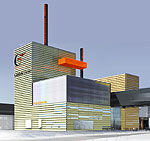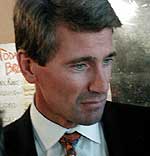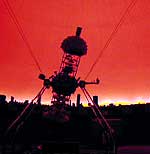By Art Hughes
Minnesota Public Radio
May 27, 2002
Minneapolis officials are assessing the damage after a legislative session in which most bonding requests within the city limits were either vetoed by the governor or shot down in the House and Senate. Minneapolis was also effectively excluded as a site for a new Twins ballpark. As bad as the session was, many in Minneapolis say it could have been worse.
| |
|
|
|
||
Minneapolis officials could only watch as more than four months of steady work toward securing bonding money for the city's two top priorities, the planetarium and three empowerment zone projects, died with the governor's vetoes.
The new Guthrie Theater and the Children's Theatre expansion are two other major requests that didn't survive. City Councilmember Scott Benson, who chairs the governmental relations committee, says he doesn't believe Minneapolis was singled out for ill treatment.
"This perceived notion that Minneapolis takes it on the chin at the Legislature just is incorrect. We were able to get virtually all of our priority projects in the bonding bill in some shape or form," Benson says. "It's unfortunate that the governor saw fit to veto those, but I don't think that says a lot about our relationship with the Legislature."
Benson points out that early in the session Minneapolis turned back the governor's proposed cuts in local government aid - a plan that would have dropped some $15 million from this year's city budget.
"The governor was not successful, and we were successful in protecting our local government aid through this session. That, frankly, would have been the most devastating blow had we lost that much. And a lot of work went into that," Benson says.
| |
|
|
|
||
Benson calls the governor's veto of the planetarium regrettable. But he says the city has built many bridges this session that will pay off if the Legislature decides to take up an emergency bonding bill early next year. He says that would be the planetarium's last chance to be included in construction of the new library downtown.
Mayor R.T. Rybak also chooses to look at a half-full glass. He says there continue to be pockets of animosity toward Minneapolis, but not as much as in January.
"I walked into that session and one legislator walked up to me - I hadn't met him - and he said, 'I'm going to stalk you. I'm going to make your life miserable over here. I'm going to follow you everywhere and say terrible things about your city.' And I said, 'Hello, nice to meet you.' I ran into that legislator the other day and that legislator is feeling a little better about Minneapolis - and that's good," says Rybak.
The Legislature last year enacted new tax changes that severely limit how Minneapolis participates in development. This year's ballpark bill specifically excluded counties from participating - a transparent attack on Minneapolis' only remaining hope to keep the Twins playing in the city, by joining ranks with Hennepin County. Rybak sees change on the horizon that could spell an easier time for Minneapolis in the future.
| |
|
|
|
||
"It's a little bit like walking into a Hatfield and McCoy feud. I think it's time to put that kind of thing behind us," Rybak says. "Some of these old histories, and some of these old legislators who can't let go of a grudge they've held since the Stone Age are gone. Now it's time for us to move forward as Minnesota, not as a collection of cities."
Rep. Wes Skoglund, DFL-Minneapolis, acknowledges the city has suffered under a Republican-controlled House. He says in the future, he hopes to see business leaders who benefit from Minneapolis' economy communicate with Republican legislators.
"If you do things like not fund North Star Corridor, which benefited Minneapolis, Anoka, Elk River, all along the Interstate 94 corridor, that does not help. That hurts," says Skoglund. "You need these transportation lines to make the whole state work. We need them to be in touch with their legislators to say - if Minneapolis suffers the whole state suffers."
Skoglund says leaving Minneapolis out of the ballpark bill may well mean no ballpark at all for the Twins, since other cities may not have a sufficient tax base.
Skoglund agrees with other elected leaders from Minneapolis that the city made strides this last session, but the payoff might not be noticeable for years to come.
More from MPR


